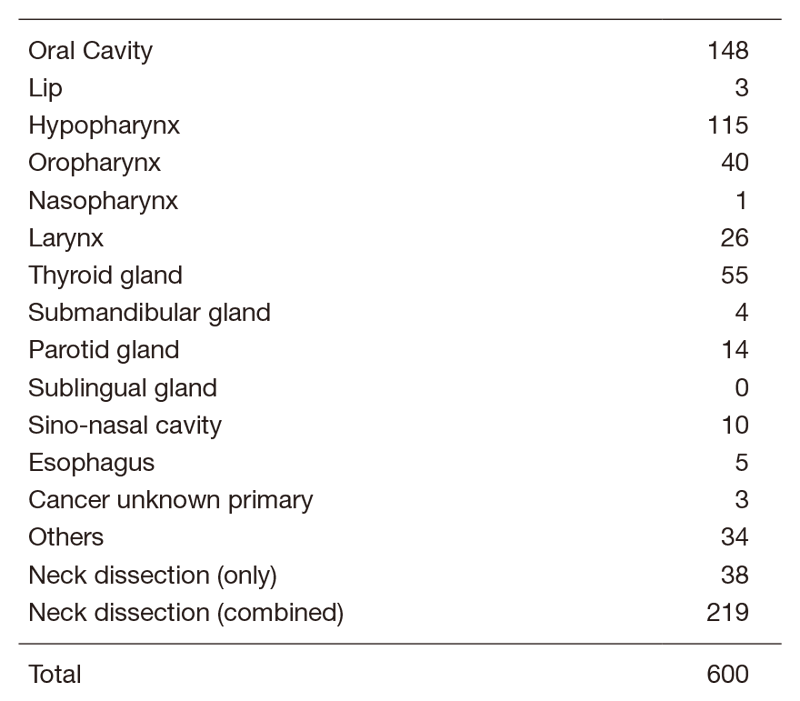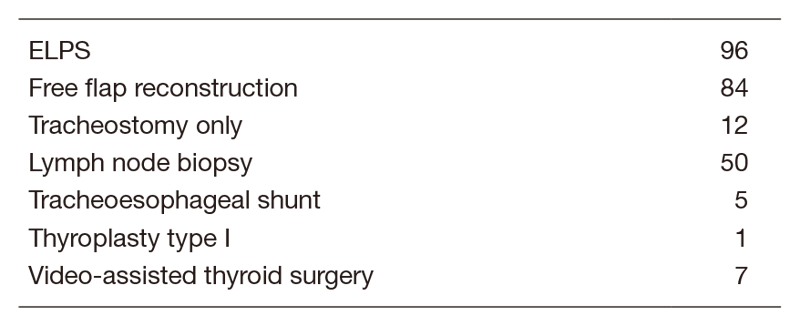Annual Report 2019
Department of Head and Neck Surgery
Kazuto Matsuura, Takeshi Shinozaki, Toshifumi Tomioka, Wataru Okano, Ryuichi Hayashi, Yohei Morishita, Masao Adachi, Yusuke Itoh, Takahiko Nagaki, Ryo Ishii, Yuki Takaoka
Introduction
The characteristic of head and neck cancer treatment in our department is that we have performed function-preserving surgery. We have been developing various larynx-preserving operations since the establishment of the National Cancer Center (NCC). These procedures include a partial laryngectomy which is indicated for T1/T2 recurrent glottic carcinoma after radiotherapy. Another example of conservative surgery is partial laryngo-pharyngectomy with preservation of swallowing and voicing function for hypopharyngeal carcinoma. We have also developed conservative neck dissection, and excision of oral or pharyngeal cancer without cutting the lower lip and mandible. Due to these efforts, there are many cases in which voice is preserved in radical surgery for laryngeal and hypopharyngeal cancer compared to other institutions. Recently, transoral resection for pharyngo-laryngeal cancer has been increasing as minimal invasive surgery. On the other hand, extensive resection with microsurgical reconstruction is designed to minimize loss of function following ablative surgery by employing the microsurgical transfer of various flaps.
The Team and What We Do
The current treatment policy for head and neck cancer is multimodal therapy. To effectively implement available therapeutic modalities, five staff surgeons at our department work closely with plastic surgeons, radiotherapists, medical oncologists, pathologists, dentists, psycho-oncologists, and nurses. To facilitate regular communication among the members of this large team, several weekly conferences are conducted. From April 2019 to March 2020, the number of operations was 600 cases. Ninety-six cases were underwent endoscopic laryngo-pharyngeal surgery (ELPS) and 84 cases underwent free flap reconstruction. In addition, endoscopic thyroid surgery was newly introduced this year, and seven cases of surgery were performed. (Tables 1, 2).
Table 1. Number of patients (April, 2019 to March, 2020)

Table 2. Type of procedures (April, 2019 to March, 2020)

Research activities
Three studies have been launched: (1) Equipment development in head and neck endoscopic surgery; (2) Creation of a head and neck cancer database; and (3) Development of supportive care in head and neck cancer surgery.
In 2019, the development of forceps for endoscopic surgery and hemostatic clip appliers were promoted. Data from approximately 6000 patients undergoing head and neck cancer surgery were then templated and a database was created. In addition, a multicenter study of an enhanced recovery after surgery (ERAS) program for head and neck cancer reconstructive surgery was launched.
Clinical trials
As a clinical study, a study on the development of diagnostic and therapeutic methods for superficial head and neck cancer based on the AMED Hayashi team (18ck0106226h0003) “National registry of superficial head and neck cancer” was advanced. A phase III study of the “TOS-J trial” (Research representative: Ryuichi Hayashi, Phase II/III study of transoral surgery for superficial head and neck cancer in Japan) started in August 2018. In addition, two studies in the JCOG Head and Neck Cancer Group (Group Leader: Ryuichi Hayashi) also made progress. JCOG1212 (Dose finding and confirmatory trial of superselective intraarterial infusion of cisplatin and concomitant radiotherapy for patients with locally advanced maxillary sinus cancer) is also underway. A number of cases were also enrolled in JCOG1601 (Randomized phase III study to evaluate the value of omission of prophylactic neck dissection for stage I/II tongue cancer).
Education
One senior resident was recruited to our department in 2019. Three medical students and 10 doctors visited our department for training. Our department was assigned as one of the observation centers of the International Federation of Head and Neck Oncologic Society (IFHNOS) fellowship program from 2014. We accepted four head and neck doctors from overseas countries (the Philippines, Mongolia, and India).
Future prospects
Head and neck cancer treatment has entered a new era of multidisciplinary treatment, with the recognition of the importance of supportive care to complete the treatment, along with improvements in surgical techniques, technological innovation in radiotherapy, and development of pharmacotherapy. In addition, the number of elderly patients with head and neck cancer is increasing, which has become a major issue in medical care. At the same time as building a smooth cooperation system between related clinical departments, we would like to promote the development of minimally invasive and function-preserving treatments such as trans-oral resection.
List of papers published in 2019
Journal
1. Imai T, Asada Y, Morita S, Saijo S, Fujii K, Kishimoto K, Yamazaki T, Goto T, Matsuura K. Preoperative prognostic nutritional index as a method to predict postoperative complications after major head and neck surgery with free tissue transfer reconstruction. Jpn J Clin Oncol, 50:29-35, 2020
2. Shinozaki T, Hayashi R, Okano W, Tomioka T, Higashino T. Treatment results of 99 patients undergoing open partial hypopharyngectomy with larynx preservation. Jpn J Clin Oncol, 49:919-923, 2019
3. Morita S, Mochizuki M, Wada K, Shibuya R, Nakamura M, Yamaguchi K, Yamazaki T, Imai T, Asada Y, Matsuura K, Sugamura K, Katori Y, Satoh K, Tamai K. Humanized anti-CD271 monoclonal antibody exerts an anti-tumor effect by depleting cancer stem cells. Cancer Lett, 461:144-152, 2019
4. Yamazaki T, Aoi J, Kishimoto K, Saijo S, Fujii K, Imai T, Asada Y, Matsuura K. Nivolumab in the Treatment of Recurrent/Metastatic Squamous Cell Carcinoma of the Head and Neck (RM-SCCHN): A Report of 16 Cases at a Single Institution. Int J Practical Otolaryngology, 2:e7-e10 DOI: 10.1055/s-0039-1685175, 2019
5. Tomioka T, Beppu T, Fujii T, Ozawa T, Asakage T, Onitsuka T, Fujimoto Y, Matsuura K, Kawabata K, and Hayashi R: Surgical management around the paratracheal area of hypopharyngeal cancer. Jpn J Clin Oncol, 49: 452-457, 2019
Book
1. Shinozaki T. Nutrition and Palliative Surgery for Head and Neck Cancer. In: Preedy VR (ed), Handbook of Nutrition and Diet in Palliative Care, Second Edition, USA, CRC Press, pp 253-260, 2019
